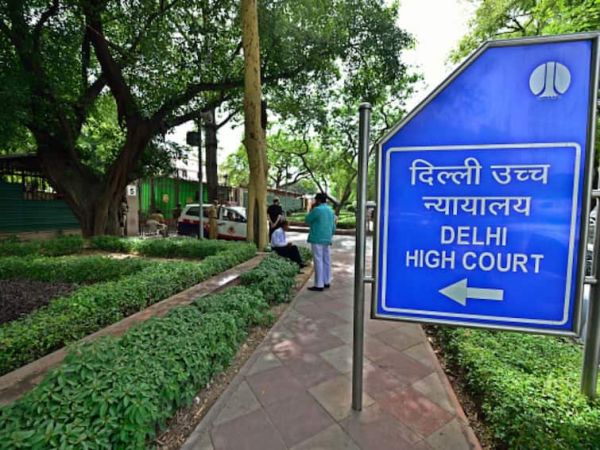
The Delhi High Court on Wednesday granted bail to two accused in the 2023 Parliament security breach case, saying their protest was not a terrorist act as it was more symbolic and an act of "political dissent".
A bench of Justices Subramonium Prasad and Harish Vaidyanathan Shankar granted the reprieve to Neelam Azad and Mahesh Kumawat on a personal bond of Rs 50,000 each and two sureties, while forbidding them from talking about the incident to the press or on social media.
The bench also noted that while Kumawat was not in Delhi at the time of the offence, Azad was not inside the Parliament building.
The bench passed the order while noting that Azad and some other accused chose the Parliament to raise their voice.
"The Parliament represents the very basis of our Democracy. It cannot be said that what the accused have done is a legitimate form of protest or demonstration. At the same time, the Appellants have not propagated any movement which can be said to be against the interest of the nation. The activities of the appellants are of the nature of propagation of ideological messages and in the opinion of this court prima facie do not constitute a terrorist act," the bench said.
It further said that the protest was "more symbolic rather than giving apprehension of substantial threat or having been done with terrorist intent. This case at this juncture appears to be a case of protest and political dissent. Even though the choice and the place of the protest is highly deprecable, it cannot be said that ingredients of UAPA are attracted while considering the issue of grant of bail".
The bench also said that had the smoke canisters, used by the accused, generated any substance which can cause death or serious injury, they would not be freely available in the market.
"This court can take judicial notice that such canisters are used in IPL games, cricket matches, and in various events and festivals like weddings, parties, Holi etc. The use of canisters which emitted yellow smoke alone does not raise a prima facie case against the appellants and as to whether those canisters could have acted as explosives or not will be tested in trial. The quantity of noxious substance in the canisters and the propensity to cause injury are also a matter of trial," the bench said.
It said that the effect of smoke of the canister in open air is to be decided in trial and at this juncture, it cannot be said that the smoke from canister can cause any hazardous health injury when used in open air and anyway the same would be decided in trial.
The court added that undoubtedly, the appellants chose the Parliament to protest, which was not the most appropriate place to stage the demonstration, however, both did not enter the Parliament.
"The material on record at this juncture shows that she (Azad) was not inclined to enter into the Parliament and chose to protest outside the Parliament which is a major distinguishing factor from those persons who entered inside the Parliament," the court said.
It added that the pamphlets which were seized from Azad did not indicate that it abetted, advised or facilitated the commission of a terrorist act.
"There is nothing on record at this juncture to show that the appellants before this Court who have not entered the Parliament, intended to threaten the unity, integrity, security or sovereignty of the country or have committed the act with intent to strike terror. Nor it can be said that the effect of the act is likely to strike terror in the mind of people or a section of people in India or any foreign country," the bench said.
It said that at this juncture, the material on record indicates that at least Azad, who was outside the Parliament, who had opened the smoke canister, refused to go inside the Parliament and Kumawat, who was not in Delhi and who had not attended the last two meetings, has not done any act satisfying the ingredients of Section 15 (terrorist act) or 18 (for conspiracy, attempts, and incitement related to terrorist acts) of the UAPA.
"There is complete lack of material at this juncture of loss of life, bodily injury or significant property damage. On the contrary, the statement given by the Lok Sabha Secretariat categorically state that no injury occurred during the incident and Azad, who was outside the Parliament, cannot be said to have committed any act which could have resulted in loss of life, bodily injury or significant property damage," the bench said.
The court further said that even assuming that the date was chosen when there was a threat perception, at this juncture, it can be only said that attempt was to "sensationalise the event to gain attention of people and get mileage from the incident".
However, this fact alone will not deter this court from granting bail at this juncture, it said.
The accused had challenged a trial court's order rejecting their bail plea.
On the anniversary of the 2001 Parliament terror attack, accused Sagar Sharma and Manoranjan D allegedly jumped into the Lok Sabha chamber from the public gallery during Zero Hour, released yellow gas from canisters and sloganeered before they were overpowered by some MPs.
Around the same time, two other accused -- Amol Shinde and Azad -- allegedly sprayed coloured gas from canisters while shouting "tanashahi nahi chalegi (dictatorship won't work)" outside Parliament premises.
(This report has been published as part of the auto-generated syndicate wire feed. Apart from the headline, no editing has been done in the copy by ABP Live.)
-
Discover the Spiritual Significance of Bahuda Yatra in Puri's Grand Festival

-
Want weight loss and also a healthy snack? Eat Makhana with these 4 delicious and easy ways

-
Mount Kailash religious and scientific importance

-
Woman’s Fiancé Tells Her To Apologize After His Sister Insulted Her

-
Love Horoscopes Are Here For July 6, 2025
